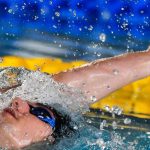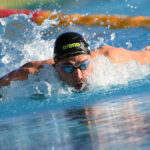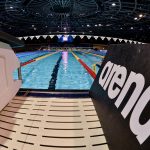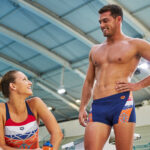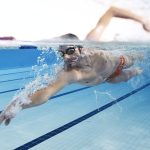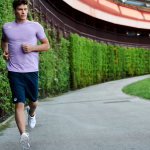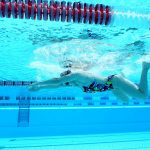The ties that bind the Campbell sister act
Cate and Bronte Campbell became the first Australian sisters to compete in the same swimming event at the Olympic Games when they both raced in the 50 metres freestyle in London in 2012.
In 2013 they celebrated together after making up half the 4×100 metres freestyle relay team that won silver at the World Championships in Barcelona.
Later this month they will arrive in Glasgow for their first Commonwealth Games as favourites to claim a haul of medals.
Here we look at the sisters’ journey that started in Malawi and continued in Australia, the highs and lows, the sibling rivalry and love and their inspirational mother.
Malawi
The story starts in Malawi, south-east Africa where Cate was born in May 1992 shortly after parents Jenny and Eric had relocated from South Africa.
Bronte arrived a little under two years later, their birthdays just six days apart.
They lived the outdoor life to the full with a menagerie of 30 chickens, two turkeys and countless guinea pigs and rabbits. They adopted hedgehogs and even attempted to bring dead pigeons back to life.
Their mother, who had been a national level synchronised swimmer in South Africa, home-schooled Cate and Bronte and two further siblings arrived, Jessica, now 18, and a disabled brother Hamish, 15.
She introduced them to the water at a very young age. Naturally, sibling rivalry came to the fore.
“Cate was a reluctant swimmer from the start,” says Bronte. “She didn’t like putting her face in the water. She was always taller than me and as the younger child you always want to be better than the older one.
“I could never beat her at anything so the only way I could beat her was to try and put my face in the water and swim faster and quicker than she could which then made her do it.
“We helped each other on in the swimming pool and that continued when we moved to Australia and we both started training.”
There was even an appearance at the Malawi national synchronised swimming championships where they came third and fourth. In a field of four.
The family spent time at Lake Malawi, swimming and learning to water-ski.
However, they were not alone in the water with the lake also home to hippos and crocodiles.
Bronte was “terrified” of hippos, a fear that Cate gleefully seized upon.
“Of course! Anything I could have over Bronte I used to my advantage. She is the more intelligent of the two so I don’t really win many arguments these days or indeed even back then so I had to use every little thing I could find, anything I could hold over her I did.
“I was definitely the sister who would come up and grab her leg or something while we were out swimming in the lake just to get a good reaction from her.”
Bronte remembers well. “Living in Australia now there’s no hippos but there are sharks and nothing’s really changed. Cate will try to swim underwater and grab my leg to make me think it’s a shark trying to eat me.
“She is very good at reminding me how much braver she was then me when she was a little girl.”
Australia
When the pair were nine and seven, the family moved to Australia, settling in Brisbane with youngest child Abigail arriving soon after.
For Cate the move was a huge culture shock, one she describes as “very daunting.”
They went to the local pool to make friends. It was a decision that would shape their lives for it was where they met Simon Cusack, the coach who guides them to this day at Commercial.
It was Bronte who shone first. Cate recalls: “She was the more dedicated swimmer. She would get up early and get me out of bed, she’d drag me off to training.
“But that all changed when we went off to our first swimming carnival and she won four gold medals and an age championship trophy. I came back with a little bronze medal for the 25 metres backstroke.
“That is good in itself but not so good when your younger sister wears all her medals around her neck and brings her trophy to the dinner table.
“Eventually I snapped and stole her medals and her trophy and hid them under my bed. Not the most original hiding spot and they were soon found and mum sat me down and said ‘Now Cate. Bronte worked really hard for those. If you want what Bronte has you are going to have to work for it’.
“From that moment on I decided that a gold medal was a pretty cool thing and so I was going to work hard.
“So I guess it is thanks to Bronte that I am in this position.
“Bronte always wanted to be an Olympian from when she was very, very young – I’d say five years old. And I just wanted to be better than Bronte so I had to become an Olympian.”
The pair committed themselves to the rigours of early starts and training and at just 15 Cate made the Olympic team, going on to claim bronze in the 50 metres freestyle and the freestyle relay in Beijing.
While proud and inspired by her older sister’s exploits, it was at times hard on Bronte who was only in her mid-teens.
“As a young kid it was always a bit irritating to have people come up to Cate and say ‘oh, congratulations, you are so good at swimming, congratulations on your Olympics, congratulations on your medals.’
“And then turn to me and say ‘oh do you swim as well?’
“At this stage I was doing the same training as Cate as well and that rankled a bit. I was like ‘oh yeah, I swim a bit.’ ‘Have you been to the Olympics? No. Okay, never mind.’ And off they’d go.
“With the help of my coach I managed to separate the two of us and not try and pin my success on what Cate’s done. Which is a very good thing because people now ask me are you ever going to beat Cate? I have come second to her so many times.
“The answer is I don’t know whether I am going to beat her and it doesn’t matter whether I do or don’t.
“I can have the most fantastic swim of my career and what’s the bet she will outshine me and have an even better swim. But that doesn’t make me any more of a failure and it is actually brilliant because then I can be happy for myself and ecstatic for Cate as well. When we both swim well it doesn’t matter who swims well and who comes second.”

Illness & Injury
Cate’s bronze-medal success in 2008 was replicated a year later at the World Championships in Rome and the trajectory was firmly upwards.
However, her world was rocked as illness reared its ugly head, glandular fever destroying her 2010 season. The subsequent post-viral fatigue prevented her from qualifying for the 2011 worlds in Shanghai.
She points out that Bronte suffered the same illness and fatigue while both have also undergone hip surgery.
Everything seemed on track, though, at the 2012 Olympics in London when Cate won gold as part of the 4×100 metres freestyle relay.
But it all came crashing down days later when she awoke with “excruciating” stomach pains and cramps, later diagnosed as pancreatitis. She passed out in the bathroom, the thud as she fell to the floor waking Bronte.
“Off she ran and got the doctor to come and they took me down to the hospital in the village. From then on she jeopardised her own preparation and possibly her own performance because she was worried about me and taking such good care of me, trying to get food from the dining hall which I then wouldn’t eat or get me drinks, stay with me in the hospital. She really was my rock at that time and I am very grateful that she was there.
“I almost feel a bit guilty but she hasn’t said she resents me for it so I think we are fine.”
Bronte recalls: “It was very tough to go from the high of seeing your sister win an Olympic gold medal two days before to having her on a drip in hospital.
“I tried to look after her as best I could but didn’t want to jeopardise my own swimming. I don’t think I did, I took care of her and it was very stressful.
“It’s an Olympic Games – it’s stressful anyway – and I wouldn’t use Cate as an excuse to say that is why I swam 0.1 off my best or whatever I did over there. It was an added stress and not something I was expecting when I went over there but it’s behind us now and it seems like it was a long time ago. Just looking forward I guess.”
Post-2012 & Beyond
A year later and the sisters were on the podium together, making up 50% of the 4x100m freestyle relay squad that won silver in Barcelona.
“That was fantastic to be in the same relay team together and with two other girls was just brilliant,” recalls Bronte. “It is great to be on a relay team anyway but to have half a relay team be your family is pretty incredible. It is the one time we get to race for each other. Everyone swam their heart out in Barcelona and it is definitely a highlight.”
The 2016 Olympics in Rio de Janeiro are looming ever nearer when they will be 24 and 22.
Both hope to swim beyond Rio with Bronte’s eyes also on Tokyo in 2020.
Immediately on the horizon are the Commonwealth Games. As of July 10, the pair are ranked first and second in the Commonwealth in the 100m freestyle and first and third in the 50m, separated by Fran Halsall, who won bronze in Barcelona.
“We have world-class talent over in Glasgow, especially in the form of Fran Halsall,” says Cate. “She is a pocket rocket. She has proved time and time again she is a fierce competitor.
“When I saw Fran’s times on paper I hadn’t met her before and I imagined her as this really tall, strong woman and then I met her and she comes up to about my shoulder and I was like what – how can you go that fast, this little pocket rocket, this little smiling assassin who gets you off guard.
“We will definitely have a fight on our hands but you know what? That is what we love, that is why we train so hard, to fight down to the last five metres and see who is tough enough.”
Family
The sisters moved into a flat late last year but still see their family regularly. They pay tribute to their parents and the driving force that is their mother Jenny.
Bronte: “Our mum is a bit of a hero. I think she can time travel and that is how she gets everything done, she is absolutely incredible.
“She taught us to swim and all the neighbours’ kids to swim.
“She home-schooled us all, she spent a lot of time caring for our brother who is severely disabled.
“She flew over to Australia with four little kids all under 10, one of them in a wheelchair and started her life all over again. Obviously with dad helping but she is an incredible woman. She has equipped us for life.
“She is a superwoman. She is the reason we are where we are now.”
Written by:
Elizabeth Byrnes
Liz swam with a local club in Sheffield, England, as a child before retiring at the grand old age of 12. Her lifelong love of the water, combined with a passion for travel, has seen Liz plunge into pools across the world. Liz spent 12 years with the Press Association reporting on swimming and athletics at Olympic and World level but is now fulfilling a dream as a freelance writer. When not in or around the water, she can be found hiking, running and cycling.
